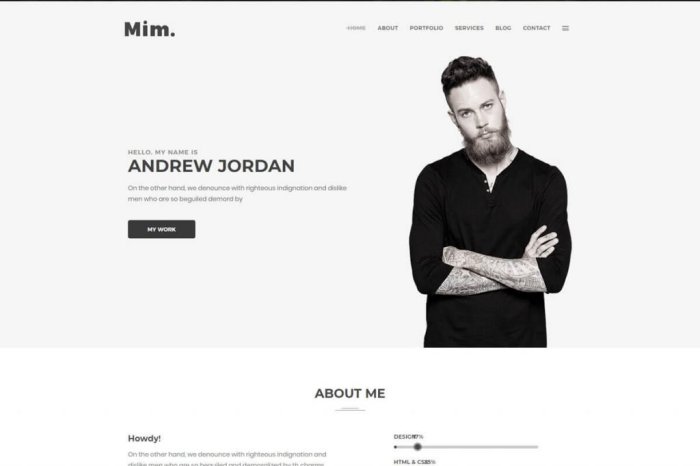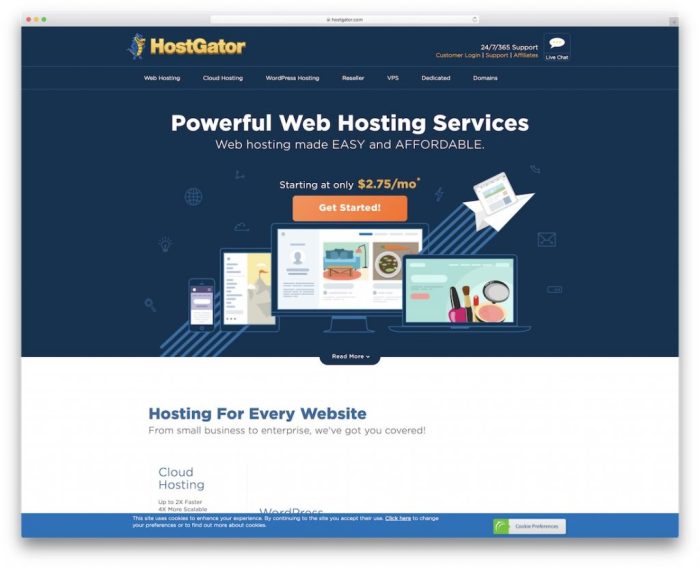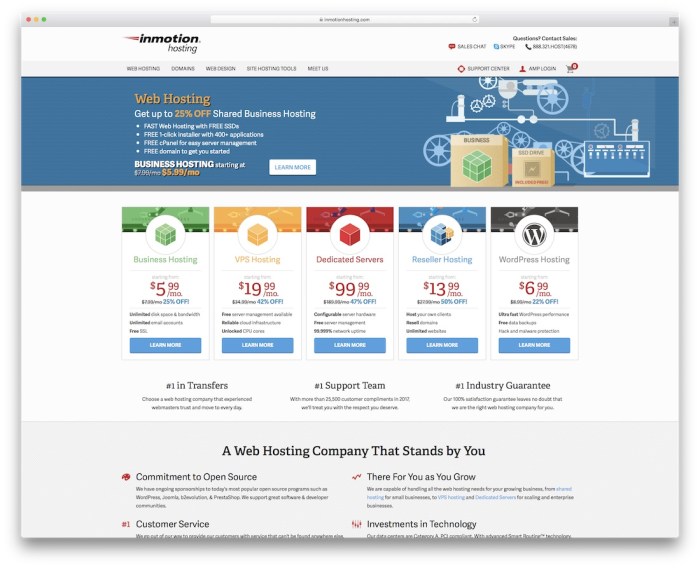Best Web Hosting for Personal Websites and Portfolios is a crucial decision for anyone wanting to showcase their work, build a personal brand, or share their ideas with the world. Whether you’re a photographer, artist, writer, or simply want a platform to express yourself online, having the right hosting solution can make all the difference.
This guide explores the different types of web hosting available, highlighting the essential features to consider for personal websites and portfolios. We’ll also delve into top providers, website optimization tips, and security best practices to ensure your online presence is both reliable and secure.
Introduction

Your personal website or portfolio is your digital calling card, showcasing your skills, projects, and passions to the world. Choosing the right web hosting is crucial for ensuring your online presence is reliable, secure, and accessible to your target audience. The right web hosting can significantly impact your website’s performance, security, and overall user experience. It’s essential to carefully consider your needs and choose a hosting plan that aligns with your specific requirements.
Key Features to Consider
Selecting the right web hosting involves evaluating various features that directly affect your website’s performance, security, and overall user experience. Here are some key aspects to consider:
- Storage Space and Bandwidth: The amount of storage space determines how much data your website can hold, while bandwidth defines the amount of data your website can transfer per month. Consider the size of your website, the number of images and videos you plan to upload, and the expected traffic volume when determining your storage and bandwidth requirements.
- Uptime and Reliability: Website uptime refers to the percentage of time your website is accessible to visitors. Look for hosting providers with a high uptime guarantee (ideally 99.9% or higher) to ensure minimal downtime and a seamless user experience.
- Security Features: Website security is paramount, especially when dealing with sensitive information. Look for hosting providers that offer features like SSL certificates, firewalls, and regular security updates to protect your website and user data from threats.
- Customer Support: Reliable customer support is essential for resolving any technical issues or questions you might encounter. Choose a hosting provider with responsive support channels, such as live chat, email, or phone, available 24/7.
- Scalability: As your website grows, you might need to upgrade your hosting plan to accommodate increased traffic and storage requirements. Choose a hosting provider that offers flexible scaling options to ensure your website can handle future growth.
Types of Web Hosting: Best Web Hosting For Personal Websites And Portfolios
Choosing the right web hosting plan is crucial for your personal website or portfolio. Understanding the different types of hosting available will help you make an informed decision based on your specific needs and budget.
Shared Hosting
Shared hosting is the most affordable option, where multiple websites share the same server resources. This means you share the server’s processing power, RAM, and storage with other websites.
- Advantages: Shared hosting is very budget-friendly, making it an excellent choice for individuals starting out with a website or portfolio. It’s also easy to set up and manage, with most providers offering user-friendly control panels.
- Disadvantages: Shared hosting can be slower and less reliable than other options, especially if the server is heavily loaded. You also have limited control over server resources and may be affected by the performance of other websites on the same server.
VPS Hosting
VPS (Virtual Private Server) hosting provides a virtualized environment on a physical server. While you share the physical server with other users, you get your own dedicated resources, such as RAM, CPU, and storage. This gives you more control and better performance compared to shared hosting.
- Advantages: VPS hosting offers a balance between affordability and performance. It provides more resources and control than shared hosting, making it suitable for websites with moderate traffic and resource requirements.
- Disadvantages: VPS hosting is more expensive than shared hosting, but still significantly cheaper than dedicated hosting. You also need to have some technical knowledge to manage a VPS server effectively.
Dedicated Hosting
Dedicated hosting gives you exclusive access to an entire physical server. You have complete control over the server’s hardware and software, providing the highest level of performance and security.
- Advantages: Dedicated hosting offers unmatched performance and security, making it ideal for high-traffic websites or those with demanding resource requirements. You have full control over the server environment, allowing you to customize it to your specific needs.
- Disadvantages: Dedicated hosting is the most expensive option. It also requires technical expertise to manage and maintain the server.
Best Hosting Option for Personal Websites and Portfolios
For personal websites and portfolios, shared hosting is often the most suitable option. It’s affordable and easy to manage, providing a good starting point for individuals with limited technical knowledge.
- If your website experiences moderate traffic and you need more control over resources, VPS hosting can be a good choice.
- Dedicated hosting is generally not necessary for personal websites and portfolios, unless you have very high traffic or specific security requirements.
Essential Features for Personal Websites and Portfolios

A personal website or portfolio is your online showcase, so it’s crucial to choose a web hosting provider that offers the features necessary for a smooth and successful online presence. This section explores essential features that contribute to a high-performing and user-friendly website.
Website Speed and Performance
Website speed plays a vital role in user experience. Slow loading times can lead to frustration, higher bounce rates, and decreased conversions. Fast loading times, on the other hand, improve user engagement, enhance ranking, and contribute to a positive brand image.
- Server Location and Network Infrastructure: Choosing a hosting provider with servers located geographically closer to your target audience can significantly reduce latency and improve website speed. High-quality network infrastructure, including fiber optic connections and robust hardware, ensures efficient data transfer and minimal downtime.
- Caching Mechanisms: Caching technologies store frequently accessed website content on a temporary server, reducing the need to fetch data from the main server every time a user visits. This significantly speeds up page load times.
- Content Optimization: Optimizing website images, code, and content can significantly improve loading speed. Compressing images, minifying code, and using a content delivery network (CDN) to distribute content across multiple servers can enhance website performance.
Reliable Uptime and Security
Consistent website availability is essential for maintaining a positive user experience and building trust. Security measures are crucial to protect your website and data from malicious attacks.
- Redundant Servers and Data Backups: Reliable hosting providers utilize redundant servers and data backups to ensure website availability even in case of hardware failures or unexpected outages. This minimizes downtime and protects your website data.
- Security Measures: Robust security features, such as firewalls, intrusion detection systems, and regular security updates, protect your website from cyber threats. SSL certificates ensure secure data transmission between your website and visitors, enhancing user trust and security.
- Monitoring and Support: Proactive monitoring and 24/7 customer support ensure prompt resolution of any issues that might arise, minimizing downtime and ensuring website availability.
User-Friendly Control Panels and Website Builders
Easy-to-use tools simplify website management and make it accessible even for users without technical expertise.
- Intuitive Control Panels: Control panels like cPanel provide a user-friendly interface for managing website files, databases, email accounts, and other essential aspects. This simplifies website administration and eliminates the need for complex technical knowledge.
- Website Builders: Drag-and-drop website builders like Wix, Squarespace, or WordPress allow users to create professional-looking websites without coding knowledge. They offer pre-designed templates, customizable elements, and intuitive interfaces, making website creation a breeze.
Customer Support and Resources
Responsive customer support and access to resources are crucial for addressing any challenges and maximizing website performance.
- Responsive Customer Support: 24/7 customer support channels, including live chat, phone, and email, ensure prompt assistance for any technical issues or inquiries. This is particularly important for beginners who may need guidance during the initial setup or website maintenance.
- Knowledge Base and Documentation: Comprehensive knowledge bases and documentation provide detailed information about website management, troubleshooting, and common issues. This empowers users to find solutions independently and reduces the need for constant support requests.
- Community Forums and Tutorials: Access to online communities, forums, and tutorials allows users to connect with other website owners, share experiences, and learn from each other. This fosters a collaborative environment and provides valuable insights for website optimization and problem-solving.
Top Web Hosting Providers for Personal Websites and Portfolios
Now that we’ve explored the different types of web hosting and essential features for personal websites and portfolios, let’s dive into some of the top web hosting providers that cater to these needs. Choosing the right provider can be crucial for your website’s performance, security, and overall success.
Top Web Hosting Providers
Here’s a comparison of popular web hosting providers, considering their features, pricing, and customer reviews. This table can help you make an informed decision based on your specific requirements and budget.
| Provider | Features | Pricing | Reviews |
|---|---|---|---|
| Bluehost |
|
Starting from $2.95/month | Generally positive, with praise for their reliability and customer support. Some users have reported occasional slow loading times. |
| HostGator |
|
Starting from $2.75/month | Positive reviews, highlighting their affordable prices and reliable service. Some users have mentioned issues with their customer support response times. |
| GoDaddy |
|
Starting from $5.99/month | Mixed reviews, with some praising their user-friendly interface and comprehensive features, while others have criticized their pricing and customer support. |
| SiteGround |
|
Starting from $3.95/month | Highly positive reviews, praising their performance, reliability, and excellent customer support. They are known for their fast loading times and secure hosting environment. |
| DreamHost |
|
Starting from $2.59/month | Generally positive reviews, highlighting their affordable prices and reliable service. Some users have mentioned issues with their customer support response times. |
Website Optimization and Performance
A fast and responsive website is crucial for a positive user experience, especially for personal websites and portfolios. A slow-loading website can deter visitors and impact your online presence. Optimizing your website for speed and performance is essential to ensure visitors stay engaged and your website ranks well in search engine results.
Website Speed Optimization
Website speed plays a significant role in user engagement and search engine ranking. A fast-loading website keeps visitors engaged and encourages them to explore your content. Search engines like Google prioritize websites that load quickly, so optimizing for speed is crucial for visibility.
- Optimize Images: Images can be a significant contributor to slow loading times. Use optimized image formats like WebP or JPEG, and ensure they are compressed to reduce file sizes. Consider using lazy loading to only load images when they are visible in the user’s viewport.
- Minify Code: Minifying HTML, CSS, and JavaScript code removes unnecessary characters and spaces, reducing file sizes and improving loading times. Many website builders and CMS platforms offer built-in minification features.
- Leverage Caching: Caching stores website content on a user’s browser or server, allowing it to load faster on subsequent visits. Enable caching features in your website builder or CMS to enhance website speed.
- Choose a Reliable Hosting Provider: A robust hosting provider with sufficient server resources is essential for website performance. Consider using a Content Delivery Network (CDN) to distribute website content across multiple servers, reducing latency and improving loading times for visitors worldwide.
Website Builder or CMS Selection
The choice of website builder or content management system (CMS) can significantly impact website speed, performance, and overall user experience.
- Ease of Use: Choose a platform that aligns with your technical expertise. If you’re new to website development, a user-friendly platform like Wix or Squarespace is a good option. For more advanced users, WordPress offers extensive customization and flexibility.
- Performance Optimization Features: Consider platforms that offer built-in features for optimizing website speed and performance. These may include image optimization tools, caching mechanisms, and mobile responsiveness.
- Security and Scalability: Select a platform that prioritizes website security and provides scalability for future growth. This ensures your website remains secure and can handle increased traffic as your audience expands.
Website Design and Content Creation, Best Web Hosting for Personal Websites and Portfolios
A well-designed website with engaging content is crucial for attracting and retaining visitors.
- Responsive Design: Ensure your website adapts to different screen sizes and devices, providing an optimal viewing experience for mobile users.
- Clear Navigation: A user-friendly navigation menu allows visitors to easily find the information they need.
- High-Quality Content: Create engaging and informative content that resonates with your target audience.
- Visual Appeal: Use high-quality images, videos, and graphics to enhance the visual appeal of your website.
- Call to Action: Include clear calls to action to encourage visitors to take specific actions, such as subscribing to your newsletter or contacting you.
Security and Backups
Protecting your website and its valuable data is paramount. Security breaches and data loss can significantly disrupt your online presence and potentially damage your reputation. This section explores the importance of website security and data backups, delving into different security measures and backup options to safeguard your personal website or portfolio.
Website Security
Website security encompasses measures taken to protect your website from unauthorized access, data breaches, and malicious attacks. A secure website ensures the safety of your data, visitors’ information, and the integrity of your online presence.
- Strong Passwords: Use strong, unique passwords for your website logins and administrative accounts. A strong password should be at least 12 characters long, including a combination of uppercase and lowercase letters, numbers, and symbols.
- Secure Socket Layer (SSL) Certificate: An SSL certificate encrypts the communication between your website and visitors, ensuring the secure transmission of sensitive data such as login credentials, payment information, and personal details. Look for websites with “https” in the address bar, indicating an SSL certificate is installed.
- Regular Software Updates: Keep your website software, including the content management system (CMS), plugins, and themes, up to date. Software updates often include security patches that address vulnerabilities and protect your website from known threats.
- Firewall: A firewall acts as a barrier between your website and the internet, filtering out malicious traffic and preventing unauthorized access. Web hosting providers often offer firewall protection as part of their services.
- Malware Scanning: Regularly scan your website for malware using reputable security tools. Malware can compromise your website’s security, steal data, or redirect visitors to malicious websites.
Data Backups
Data backups are essential for website recovery in case of data loss due to accidents, technical failures, or malicious attacks. Regular backups allow you to restore your website to a previous state, minimizing downtime and data loss.
- Automatic Backups: Many web hosting providers offer automatic backup services, creating regular backups of your website files and database. This ensures that your data is backed up automatically without requiring manual intervention.
- Manual Backups: You can also manually back up your website files and database using FTP clients or website management tools. This allows you to create backups at your convenience and store them in a secure location.
- Off-site Backups: It is recommended to store backups off-site, meaning in a location separate from your primary server. This protects your data from disasters that could affect your server, such as fire or flood.
- Version Control Systems: For websites built with dynamic content, version control systems like Git can be used to track changes to your website code and create backups at different points in time. This allows you to easily revert to previous versions if needed.
Conclusion

Choosing the right web hosting for your personal website or portfolio is crucial for its success. You need a provider that offers a balance of reliability, affordability, and features that cater to your specific needs.
Key Takeaways
Here are the key takeaways to remember when selecting a web hosting provider:
- Determine your website’s needs: Consider factors such as traffic volume, storage requirements, and the complexity of your website.
- Prioritize reliability and uptime: Look for providers with a proven track record of high uptime and excellent customer support.
- Choose a provider with essential features: This includes features like website builders, security tools, and backups.
- Optimize for performance: Select a provider that offers fast loading speeds and efficient resource allocation.
- Compare pricing and plans: Consider your budget and choose a plan that offers the best value for your needs.
Choosing the best web hosting for your personal website or portfolio doesn’t have to be overwhelming. By understanding the key features, comparing providers, and prioritizing your specific needs, you can find a solution that empowers you to create a stunning online presence and showcase your talents to the world. Remember, a well-chosen hosting provider can be the foundation for a successful online journey.
Quick FAQs
What is the difference between shared hosting, VPS hosting, and dedicated hosting?
Shared hosting is the most affordable option, where multiple websites share resources on a single server. VPS hosting offers more resources and control, with a virtualized server dedicated to your website. Dedicated hosting provides the highest level of performance and security, with an entire server dedicated to your website.
What are some tips for optimizing my website speed and performance?
Optimize images for web, use a content delivery network (CDN), minimize HTTP requests, and choose a fast website builder or CMS. Regularly monitor your website’s performance and make adjustments as needed.
How do I protect my website from security threats?
Use strong passwords, enable two-factor authentication, install security plugins, and regularly update your website software. Back up your website data regularly to prevent data loss in case of a security breach.